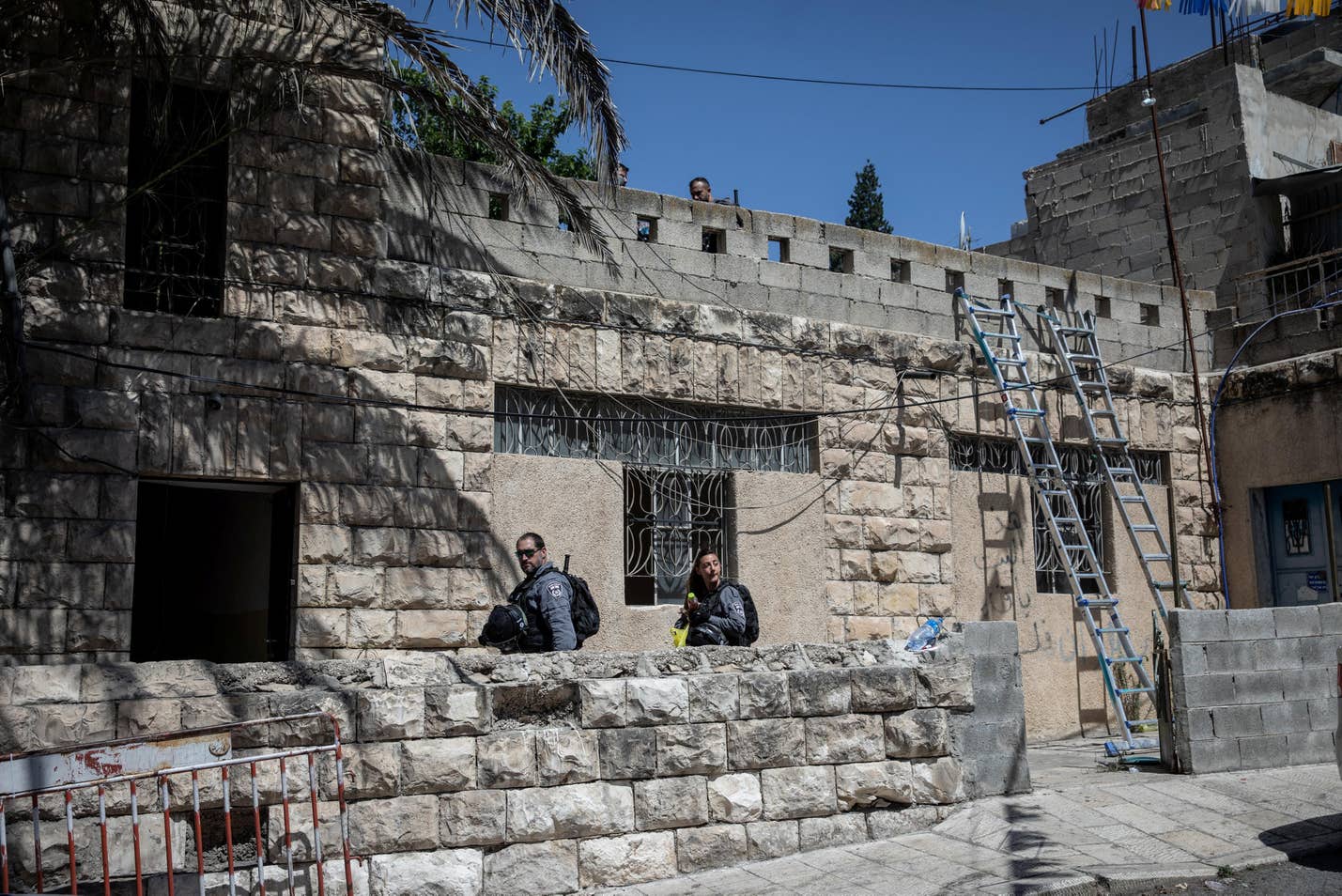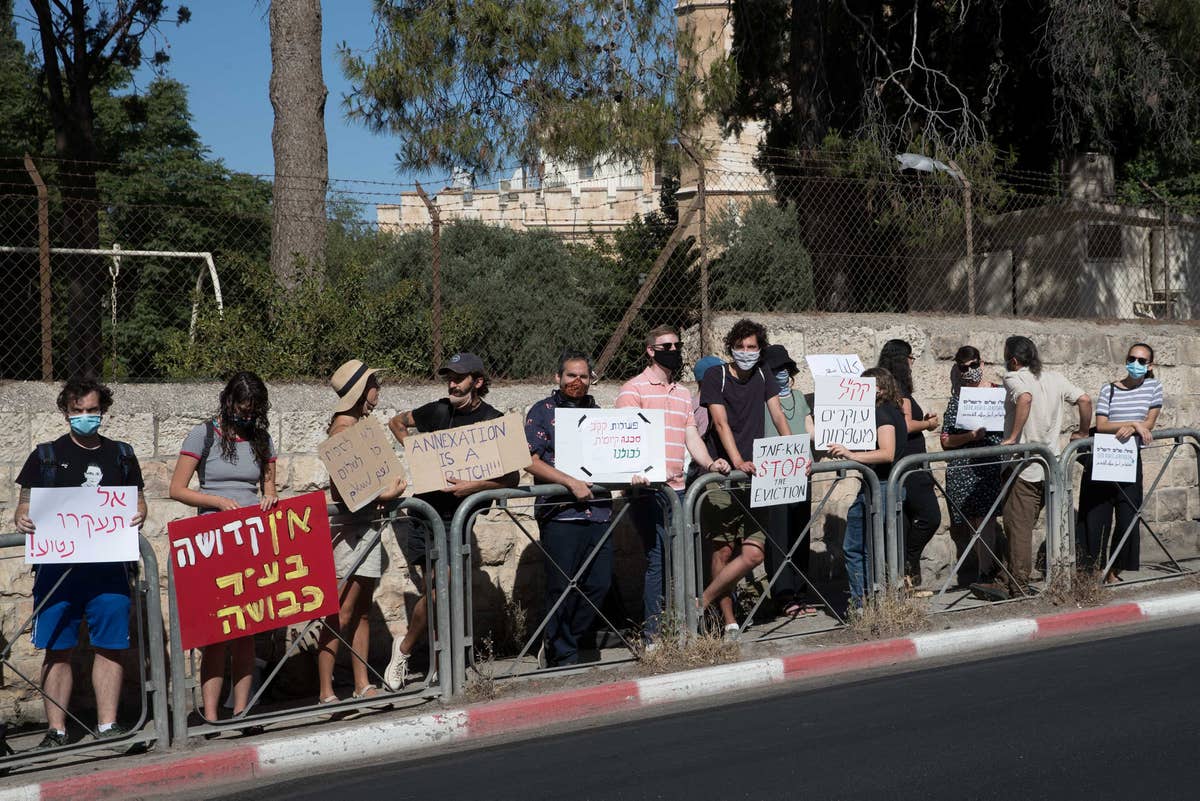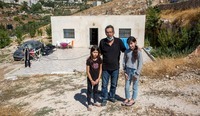Court Orders Dozens of Palestinians Out of Jerusalem Homes to Make Way for Settlers
 Tuesday, September 15, 2020 at 09:22PM
Tuesday, September 15, 2020 at 09:22PM by Nir Hasson. 15 September 2020 Haaretz
Judges base evacuation orders in two cases on claims to Jewish ownership of property from before 1948, which the law permitsfor Jews only

According to Israeli law, returning property from before the 1948 war is permitted for Jews only, while Palestinians are ineligible to reclaim property abandoned before 1948. In both cases, right-wing activists had been working to expel the residents since acquiring the land or took control of an Ottoman-era trust.
Jerusalem Magistrate’s Court Judge Efrat Eichenstein ruled that 26 members of al-Fatah Rajbi family living in the Baten al-Hawa neighborhood in Silwan must hand over their homes to Ateret Cohanim. The family has lived there since 1966, after the grandfather bought the land from a Palestinian seller. However, the court accepted the claim of Ateret Cohanim representatives that Jews had owned the land before 1948 as part of a Yemenite neighborhood in Silwan.
The land had belonged to an Ottoman-era trust registered in the name of one Rabbi Moshe Benvenisti. The Jerusalem District Court granted the request by three Ateret Cohanim members to become trustees of the land in 2001. They have since sued some 700 Palestinians living on land belonging to the trust with the aim of having them evicted. In one of Ateret Cohanim’s many lawsuits, the court ordered the eviction of 11 families, numbering 67 people, from Baten al-Hawa. The families appealed before the Jerusalem District Court, which has yet to issue a final ruling.
Peace Now said following the decision: "For every dunam of land owned by Jews before 1948 that was lost in the war, there are hundreds of thousands of dunams of land in Israel that were owned by Palestinians before 1948 and were lost. The settlers’ demand to evict Palestinians based on pre-1948 ownership is a strategic threat on the moral justification of hundreds of thousands of Israelis living on properties and lands that had belonged to Palestinians.”

In a similar case in the neighborhood of Sheikh Jarrah, Judge Miriam Lifshits ruled that three Palestinian families living in the neighborhood since the 1950s must evacuate their homes and turn them over to a company owned by right-wing activists. The Jordanian government and the United Nations built the homes for Palestinian refugees in the 1950s. In this case, the company, Nahalat Shimon, proved that the land had belonged to the Sephardic Jewish community council and the Ashkenazi council before 1948 and was sold to it in the 1990s. The judge accepted the company’s claims and ordered the residents’ eviction by the end of August. She also ordered the Palestinians to pay the plaintiffs 30,000 shekels ($8,800) in court fees.
On Monday, the Supreme Court rejected the appeal of a 78-year-old Silwan resident against eviction from his home. His landlord had sold the home to the Elad settler association, which is seeking his eviction, but a Magistrate’s Court recognized him as having protected tenants’ rights. The court ruled that the association was entitled to evict him but would have to pay 360,000 shekels compensation. The Jerusalem District Court rejected both sides’ appeals. The Supreme Court ruled that the man must leave by mid-October.
- Israel on Track for Record Number of East Jerusalem Home Demolitions
- After Coronavirus Freeze on Demolitions, Israel Tears Down Homes of 65 Palestinians
- Jerusalem Mayor Freezes House Demolitions in Restive Palestinian Neighborhood
In June, Silwan residents filed a petition against Ateret Cohanim and the Charitable Trust Registrar, arguing that the association has a serious conflict of interest with the Benvenisti Trust, and that it is not honoring the original trust, which was created 120 years ago to benefit the city’s poor. The petitioners argue that, in taking control of the land, the association has effectively become the landowner. Judge Eichenstein accepted the trust’s position, ordered the homes evacuated by next April and ordered the Palestinians to pay the trust 7,500 shekels.
***********************************************************************************
Israel on Track for Record Number of East Jerusalem Home Demolitions
Many families with houses built without permits have asked for demolitions to be delayed in light of economic hardship and the coronavirus crisis, to no avail
by Nir Hasson. 22 August 2020 Haaretz

The city is on track for a record year in the number of razings in the mainly Palestinian eastern half of the city, following a a two-month suspension during the lockdown this spring.
So far this year, the municipality has knocked down 89 residential units, compared to 104 for all of 2019 and 72 in 2018. In the first three weeks of August alone, 24 homes were torn down. Most of the actual demolition work is done by the residents themselves, in order to reduce expenses. The city’s legal department and the courts refused some families’ requests for a postponement due to economic hardship and fear of infection in East Jerusalem neighborhoods with a high incidence of COVID-19.
The Abda family – two parents and their four children, aged 10 to 22 – live in a small, single-story home at the edge of the Jabal Mukkaber neighborhood. The father, Fawz Abda, built it five years ago, without a construction permit, after he realized that it was impossible to obtain one. As a result of absent master zoning plans, inadequate infrastructure and difficulties in land registration, it is nearly impossible to build legally in most East Jerusalem neighborhoods.
A demolition order was issued for the home around a year and a half ago. All of Abda’s applications to the court for local affairs and to the Jerusalem District Court were denied, despite the fact that the family’s home is at the edge of the neighborhood, just a few meters outside of an area where a residential zone is planned. In addition, Abda lost his job at a hotel due to the collapse of the city’s tourism industry, and the family is in financial crisis.

The Abdas and their lawyer, Mohand Jabara, recently appealed to municipal legal advisor Haim Nargasi, Jerusalem Mayor Moshe Leon, President Reuven Rivlin and many other figures in a bid to postpone the demolition until Abda finds new work, to no avail. On Thursday, police officers surveyed the site, and demolition is expected within days. The family has packed their belongings. “They said we’d have 20 minutes to remove our property, so at least we’ll have a little clothing,” Abda says.
“There’s no peace now. I wake up four or five times every night, my daughter and I sit and watch and suddenly the sun is shining. We have no other place, we’ll put up a tent here and stay, without electricity or internet,” says Faryal Abda, Fawz’s wife. What worries her most is the fact that without a home, her children won’t be able to study, since most of their schooling is remote and requires an internet connection.
- After Coronavirus Freeze on Demolitions, Israel Tears Down Homes of 65 Palestinians
- Israel's Top Court Halts Home Demolition of Palestinian Accused of Killing Soldier
- Jerusalem Mayor Freezes House Demolitions in Restive Palestinian Neighborhood
“Every time a backhoe passes by I think, that’s it, they’re coming,” Fawz says. In the letter that Jabara sent on his client’s behalf to the city’s lawyer, he wrote that “the home is the only roof he and his family have, and its destruction will mean the parents and their young children will become homeless during this difficult time of the coronavirus outbreak.”
During the strict lockdown this spring, the city suspended home demolitions due to the emergency situation in the country, even though in this period the infection rate in East Jerusalem was very low. But after the lockdown was lifted in May, the demolitions resumed at an accelerated pace, and nearly every day homes are razed in that part of the city.

According to data collected by the civil society organization Ir Amim, August is on track to break a years-long record for the number of home demolitions in East Jerusalem, despite the high coronavirus infection rate in the city’s Palestinian neighborhoods. Some 2,000 people in East Jerusalem have COVID-19, and every day dozens of new patients are diagnosed. In addition, the economic crisis is taking a particularly heavy toll in these neighborhoods, where many residents work in restaurants and in the tourism industry.
 APJP |
APJP |  Post a Comment |
Post a Comment |
Reader Comments